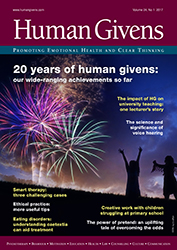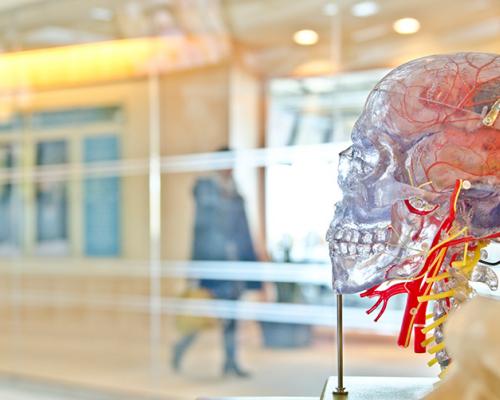Why hypnosis and the power of the mind matter in medicine
In the 1930s a Bedouin tribesman introduced a young Irish doctor to the powers of the subconscious mind. Sixty years later, after doing over four thousand operations using hypnosis. Dr Jack Gibson talks to Joe Griffin.
Joe Griffin: Can I take you back to the beginning, how you became interested in hypnosis because when you qualified as a surgeon it wasn't part of the curriculum.
Dr Jack Gibson: When I was a boy there was a clergyman who used hypnosis for people who were getting seasick and he cured them. I was most impressed by him. Later on when I took up medicine I went to my professor, I told him about hypnosis and he told me that no doctor uses hypnosis, it is only used by quacks. In the Channel Islands a few years later I watched a stage hypnosis show and I saw the possibilities. I asked a psychiatrist if hypnosis could be used to treat an asthma case. He said he could do it himself. He took the asthma case into a mental hospital, the doors were locked, the relatives weren't allowed to see the patient for three days and the patient came back a wreck.
Griffin: He was allegedly using hypnosis?
Gibson: I suppose he knew a bit about it but he didn't know much. It was while practicing surgery in the Middle East as a young graduate that I first encountered the beneficial effect of the controlled use of the subconscious mind. A Bedouin tribesman had a growth on his leg which tracked down between the muscles. He knew it would have to be removed. But he said "I won't have any anaesthetic". I offered him a local anaesthetic but he refused it. As I operated on him, I myself felt that he must be suffering great pain. I actually felt the pain myself. When the operation was over, he said, calmly, "May I see it before you put the dressing on?". It was only later when I learned to operate with hypnosis myself that I realised that he hadn't suffered any pain at all. Then, later on, I was in Africa, about 36 years ago, I was in a practice there, I was the surgical part of the practice. I went to see a man who had a bad chest, his bed was burnt from going to sleep smoking a cigarette at night. I was afraid of him setting the house on fire, for he had children in the house and it was a long way from anyone. I thought the children could be burnt to death. So I thought I'd hypnotise him, he was my first case. He went very deep. I was thrilled by it, and after that I got into it in a big way.
Griffin: Did he stop smoking?
Gibson: I don't know. He responded to my posthypnotic suggestions and I took it for granted he'd stop. I knew nothing about hypnosis then. Nowadays I would get him to confirm that he had stopped.
Griffin: So that was your first case!
Gibson: Then, only three days later, a person rang up. She had a paralysed leg and I suspected it was psychosomatic. So I went out to see her and, sure enough, it was. She got over it in about half an hour. I had enough sense to try to get her to face up to the things that made her leg paralysed.
Griffin: So you were doing psychotherapy as well as hypnosis from that point?
Gibson: Yes. And she was going to have a baby and she had the baby under hypnosis. It was absolutely marvellous.
Griffin: That was some time later?
Gibson: That was about a fortnight later.
Griffin: So, you'd established your credentials with her by getting her leg cured?
Gibson: Yes. After that I used hypnotherapy whenever possible. Later I came back to Ireland and took up a job as a surgeon in the hospital, here in Naas, and a very busy practice it was too.
Griffin: What was the reaction of the doctors here in the hospital when they saw you using hypnosis?
Gibson: Positive. I had no complaints in twenty years of working.
Griffin: So they had an open-minded attitude to it. Even using hypnosis as an anaesthetic?
Gibson: Yes.
Griffin: So how many operations do you think you've performed using hypnosis as an anaesthetic?
Gibson: Over four thousand, but that includes all the simple operations as well. I used it all of the time, for dislocations, for fractures, for people injured in car accidents. Very often they would have had a meal beforehand and of course then, to use anaesthetics, we'd have had to wait a long time for the stomach to empty but, with hypnosis, I could work straight away.
Griffin: Do you think that saved the hospital money?
Gibson: The amount of money saved was enormous.
Griffin: Yes. I was wondering about that. In terms of theatre time and keeping people longer in bed and having more doctors involved.
Gibson: But they never considered that.
Griffin: Something that would be very relevant today, don't you think , when all the state medical services are overburdened financially?
Gibson: Well, they could cut down expenses tremendously. You take a fractured nose, admit to hospital, operate the next day. Whereas I would just take the fellow and hypnotise him and give it a push to straighten it, put on a splint to keep it in place, and then let him home. The cost would be a fraction of the cost of an admission.
Griffin: So do you see a case for doctors and anaesthetists being actually trained in hypnosis and using it?
Gibson: I think all doctors and anaesthetists should be trained in the use of hypnosis.
Griffin: What do you think stops that happening?
Gibson: Prejudice!
Griffin: What do you think is the source of that prejudice?
Gibson: Money!
Griffin: It is not in some people's financial interests to use hypnosis.
Gibson: I have trained doctors here and they don't use it. If they went into a surgery and there were twenty people there and each of them willing to pay for treatment, and if they were to take the people out who needed hypnotherapy and give them an hour or an hour and a half they would obviously see fewer patients and therefore earn less money. But what they don't realise in the national health service where people are paid so much per year, if they treated an asthma case they'd get better and they'd save an awful lot of money and save a lot of time.
Griffin: So you found asthma responds well to hypnosis?
Gibson: Absolutely. Dramatically.
Griffin: Is this particular types of asthma?
Gibson: All cases of asthma, particularly with children.
Griffin: There was an anecdote in your book about you once being invited to see what you could do for a hospital ward full of children suffering from asthma. The children stayed there an average of six months. All the children you worked with responded really well to hypnosis. Yet you were asked to discontinue your work by the hospital authorities.
Gibson: Yes. They thought I was using magic. There is probably no condition among children which is so easy to treat with self hypnosis. I have found that most asthmatics lose their attacks almost right away, their lives transformed in the process. Sometimes the attacks stop with the child's first lesson in relaxation. To help the child (or an adult) to learn how to relax in the event of another attack a self hypnosis tape is very useful. If the child has learned to relax listening to the tape, then in the event of an attack it is relatively easy for the child to relax listening to the tape and let the spasm pass. In my view, having dealt with many asthmatic cases, there is one factor common to all allergies and that factor is subconscious fear. It is only in the reaching of the subconscious mind, with the erasure of the erroneous information stored there and its replacement with the true facts, that a cure will be effected. When an asthmatic attack occurs fear causes the muscles in the lungs to go into spasm, but if a child has learned how to relax, the first thing he must think about is relaxing and then the fear will go, and with it the asthmatic attack. So that in time he becomes free from asthma.
Griffin: More generally, would you see hypnotherapy as an effective treatment mode for many illnesses?
Gibson: I believe hypnosis to be as effective as antibiotics. Of course, antibiotics will cure diseases which hypnosis cannot help, but hypnosis can cure cases where antibiotics are of no use whatsoever.
Griffin: Can you expand on that?
Gibson: If any doctor were to practise without using antibiotics he would risk being struck off the medical register - many of his patients would die unnecessarily without their use. Yet, if one who had used hypnosis were faced with the choice of whether he should give up using antibiotics or hypnosis, he would be faced with a difficult choice. At first sight it might appear that antibiotics are, beyond question, the more important. Yet antibiotics, unlike hypnosis, can touch only a small proportion of human suffering. When penicillin was first discovered , a small batch was sent to the north of England for experimental use, no one seemed to believe in it and it lay there unused. Consequently, even though a relatively junior surgeon, I was allowed to make the first trial and I injected it into a septic hip joint. The result was dramatic and I have prescribed antibiotics ever since. I believe that shutting one's eyes to the use of hypnotherapy is as unscientific as the shutting of eyes then was to the possible use of penicillin. That's because, if they are closed to the fact that there is access to the subconscious mind,we will continue to treat patients symptomatically with such things as tranquillisers, sleeping tablets, bronchial dilators and so on, instead of aiming at curing the root cause of the complaints.
Griffin: How can hypnosis help one to find that root cause?
Gibson: The nervous system is composed of the voluntary and autonomic nervous system. The autonomic system is controlled by the subconscious mind. Hypnosis gives access to the subconscious mind. If we, as doctors, do not accept this fact then we are cowboys. Cowboys without lassoes, for if we cannot catch this elusive beast, we will continue to see the appalling unnecessary suffering and death from readily curable psychosomatic diseases.
Griffin: The other side of all this is that, if people respond so well to suggestion, then presumably influential figures like doctors in their practice may be giving what are, in effect, hypnotic suggestions, but may not be aware they're giving them when they are offering a prognosis on an illness. For example, when the doctor casually says 'we are talking here about months rather than years', the patient may take that as gospel, he may take it as a form of hypnotic suggestion and actually die on cue.
Gibson: It's true.
Griffin: So perhaps part of the education process that is needed is for all health care personnel to be aware of the power of suggestion, both negative and positive.
Gibson: Yes. We've need to be very aware of that.
Griffin: You on your part must be unique in having performed over four thousand operations, major and minor, using hypnosis. Probably very few doctors in the world could claim to have had that much experience with the medical use of hypnosis.
Gibson: Except of course with acupuncture in China. Acupuncture, I think, is hypnosis being used.
Griffin: That's interesting. I saw some research done by two doctors in the states called Spiegel and Spiegel and they found that the subjects who responded well to acupuncture also respond well to hypnosis. They also speculated that acupuncture is a form of hypnotic induction.
Gibson: It is. About thirty years ago a Mr Chance, a great orthopaedic consultant here in Ireland, was very taken with hypnosis and he advised me to use it but added "for goodness sake give them an injection at the same time, it doesn't matter if it's only vitamin B or water, let them feel the injection does it”. I couldn't do that, I didn't think it was honest. The acupuncture people have a needle and they jab the needle in. The acupuncturist is convinced it works, the patients are convinced it works, the hospital is convinced it works — and so it does work.
Griffin: But why it works is another matter.
Gibson: They can put the needles in sites other than the official sites and it still works. Or they can use electrical wires to simulate the acupuncture and get even better results. Their success rate is very similar to that of pure hypnosis.
Griffin: Since you have raised the issue, can I ask you when you were using hypnosis in surgery what proportion of patients would respond to hypnosis?
Gibson: That's a question I find hard to answer as I kept no notes. There is a difference between a cold case and an emergency. If I said to you, "will you have this finger off under hypnosis or a general anaesthetic" almost for certain you would say a general anaesthetic, and if I tried to hypnotise you, it wouldn't work. But if you came into hospital with your finger bleeding and your stomach full and there is no way we can operate on you for some time , you would accept hypnosis. I think we have a high rate of patients under those conditions who are good subjects.
Griffin: What is your preferred method of inducing the anaesthesia? Is it a distraction technique or telling them that their hand will go numb?
Gibson: I will start from the beginning. I pick up the hand very gently. I tell them "If you relax you will feel less pain. And if you relax very deeply, you may actually feel no pain at all". I then, holding the arm in the gentlest way, wash around the wound with an antiseptic such as iodine which can cause pain, but I am very careful not to let a drop fall into the wound. Then I get an antiseptic that doesn't hurt and gently put it into the wound. But the whole time I'm telling them, "If you relax, it will help you. Relax deeper and deeper". And then when I start to stitch, I pick up a needle, I say to them "I can give you an injection now and you won't feel any pain but the injection won't take the pain away completely because when the effect wears off you will feel the pain again. But if you relax deeply enough for the stitching not to be felt it will be grand. I can stitch the wound then you will have no pain and no pain afterwards".
By this time the person is probably hypnotised. I can pick out any pieces of dirt that are in the wound without causing pain. Now the person is becoming deeply hypnotised and I can dispense with the anaesthetic and put in a stitch and they won't feel any pain at all. At the same time it may be necessary to cut the edges of the wound off to make them even and less ragged. This will be done without any pain whatsoever.
When I have finished the stitching, the person is feeling very well. They have enjoyed, actually enjoyed the feeling of the arm being numb and the wound being stitched. They will accept the feeling of being free from pain and even be free from pain later on when the stitches are removed.
Griffin: That really does help to clarify the way you induce anaesthesia with hypnosis.
Gibson: When I was in Vienna last year I went out to dinner with friends. There was a man there who didn't know anything about hypnosis. A colleague asked me to explain to him how I stitched a wound using hypnosis. I took his hand very gently and 1worked with him. When I'd finished, my colleague said "look at him , his hand is up in the air and he can't put it down". I had to tell him "your arm is free".
Griffin: Have you heard about Dr. Escudero in Spain? I have heard he uses a technique involving the use of saliva to produce anaesthesia.
Gibson: There is only one way and that is by getting the person to relax. He has a hospital where everybody is keyed up to do this one thing and he believes it, the patients believe it, the hospital, of course, believes it, and it works. In his method the mouth must be wet, if the mouth is wet the person isn't terrified. If you were terrified it would be dry. Witch doctors used the same technique in Africa. If a man committed a murder, say, the witch doctor would get all the men in the village to line up. They all believed he had magic powers, and he would go around with a hot poker and touch all of their tongues and the murders' tongue would be burnt because his mouth was dry. Those with wet tongues wouldn't have any pain.
Griffin: When you retired as a surgeon you then went into hypnotherapy practice treating psychotherapy patients. Wasn't that a big change?
Gibson: Yes, it was a big change, but remember, I retired at the age of seventy, I had to retire anyway, but by then I had so many hypnotherapy cases I was glad to. For the previous twenty years I had practised both surgery and hypnotherapy.
Griffin: I want to ask you where did your expertise in understanding human nature come from? That's a completely different field from being a surgeon.
Gibson: Very few have much understanding of human nature, or the ability to share compassion. I suppose I always was interested in people.
Griffin: I am interested in the approach you take to the different types of complaints and illnesses as outlined in your book and tapes. I was impressed by your creative use of language and suggestion and the psychological insights that you use. It seems to me they must have come from a lot of reflection but also there must have been some sources for this insight and knowledge.
Gibson: I think most of it came from my religion. There was a man called Lesley Weatherhead who wrote many books, I was interested in what he did.
Griffin: He explored the mind from a psychological philosophical and religious perspective. You drew inspiration from his books?
Gibson: Yes and from himself.
Griffin: In what way from himself?
Gibson: I went to hear him preaching. I was spellbound.
Griffin: Do you suppose he was a bit of a hypnotist?
Gibson: Well, I suppose every good preacher is really.
Griffin: Do you think that religious views, or at least a commitment to something beyond oneself, is important in mental health?
Gibson: If they are truly religious!
Griffin: How would you make that distinction?
Gibson: Some people are religious but they don't believe in the truth, not in their lives.
Griffin: What do you think is the fundamental religious truth?
Gibson: I'm not particularly religious in the terms of orthodox or any other kind of religion. I believe the world was born with a big bang. I don't know if all we are told is true.
Griffin: Do you suppose that there is a deeper pattern that somehow connects human beings and that religion,historically, has tried to encapsulate and express that, and that one doesn't have to be a member of a formal religion to be aware or have a sense of this pattern?
Gibson: Yes.
Griffin: I believe you were the first person to make a self hypnosis record.
Gibson: I'd be interested in finding out. I think I was the first - in about the late 1950s. It was for treating any condition but mainly asthma, but I didn't sell them. But in 1962 I made an EP and sold it, and then, when cassette tapes came out, I recorded on them. In 1970 my Stop Smoking recording was top of the pops in Ireland for six weeks running.
Griffin: Alternative therapies are becoming increasingly popular. Do you think this reflects some inadequacies in the medical model and how it's being applied in practice?
Gibson: I think we are far too slow in taking on the fact that we have a subconscious mind. When I gave my lecture to the Medical Society at University College Dublin, I said that the medical profession was influenced by body snatchers and we learnt about how the body works. But the dead body has no mind. And still today we spend years teaching how the body works but only a few minutes teaching how the mind works. We need to realise that the mind is just as important as the body.
Very early on in my career, I found that I had been very well taught in the physical side of medicine, but had received almost no training in the causes or treatment of most of the illness I met in practice. We were taught to treat asthma with cortisone and bronchial dilators. I saw the attacks disappear for a time but they nearly always returned. I gave painkillers to migraine suffers but their migraine returned. I treated insomniacs with sedatives but none were cured of the underlying cause of their inability to sleep. I saw the addicts of drugs, alcohol and nicotine listen to my advice only to reject it. This led me to realise just how much human misery has its origins in the mind. To get to the root of the problem we have to be able to tap into the power of the subconscious mind and to release the faulty learnings often contained there.
Griffin: So doctors have to be able to learn to tap into the power of the mind.
Gibson: And that's where we've gone wrong. We haven't done that.
Griffin: Take a doctor seeing one hundred and twenty five or more patients in a week - would it be practicable to expect him to be able to utilise that knowledge?
Gibson: We don't have enough doctors to treat everybody. Just having a number of people treating the physical illness is not enough. We've got to have people treating the mental side as well. There's far greater need on the mental than on the physical side. More people are in hospital who are suffering from a psychosomatic illness than from a physical illness.
Griffin: What illnesses would you classify as psychosomatic?
Gibson: Well, take all the mental hospitals: there are more people in the mental hospitals than there are in the general hospitals. In the general hospital there are a lot of people injured in accidents caused by alcohol abuse, people dying through the effects of smoking and other drugs, and illnesses caused by stress. So if we broke down the physical illnesses the majority of them could even be seen as psychosomatically caused.
Griffin: You'll be interested in the report in the report published in The Therapist on various methods of getting people to stop smoking, including the patch, and it was found that hypnotherapy was easily the most effective.
Gibson: I get most people to stop without withdrawal symptoms, although I don't promise that. But I notice that those who are really keen very often stop without any withdrawal symptoms.
If someone knows that smoking is likely to cause them a great deal of suffering, but still retains reservations about quitting, then it is not nearly so easy. It's important to have sincerity of intention because this makes reaching into the emotions and achieving harmony proportionally easier. But if one has honestly decided not to take nicotine again than this thought can be transferred to the subconscious mind and very often the person can stop smoking without withdrawal symptoms.
Griffin: So the very fact that they are highly motivated, combined with suggestions from you telling them that they are going to feel comfortable and relaxed and confident as non-smokers, is sufficient to generate the ability to be free from cigarettes without the withdrawal symptoms. That's an amazing relief from suffering.
Gibson: Absolutely! My daughter gave up smoking. She wouldn't come to me. People don't go to their relatives, but it's three years now and she's still got the withdrawal symptoms.
Griffin: I notice in your book you are also quite optimistic about helping people with obesity, that you feel that hypnotherapy can help them to lose weight successfully.
Gibson: Losing weight is different. Smoking — we can forget about it, but we can't forget eating. We have to have consistency. If a person wants to lose four stone they have got to think in terms of a couple of years and not to think of it happening in a few months. If they think of it as a Iong term thing they can learn to gradually reduce and enjoy their food more than they are enjoying it now. An overweight person doesn't usually enjoy food as a rule. Some do but most don't.
Griffin: That's because the feel so guilty.
Gibson: Yes because they feel guilt. If they would eat reasonable amounts and stop when they are no longer hungry they would lose weight, and there is no other way in which it can be done. Reducing weight in this way does not strain the will as other dieting methods tend to do. With relaxation and mind control, the whole being is in harmony in the intention to lose weight.
Griffin: I was also very impressed as to how you helped people with drink problems, because there you actually did some research into the problem as to the best approach and actually worked and researched with alcoholics as to what would be the most effective way of doing it.
Gibson: They used to come here and sit in the evening, the alcoholics, some of their relatives and some of the people who treated them. The alcoholics tore my self hypnosis record to pieces week after week, but I kept on going until they said they were satisfied with it, and that had it been available earlier it could have saved them years of hell.
Griffin: You had the alcoholics fantasise in hypnosis going for a drink!?
Gibson: Yes. They loved that part. The part where they relaxed and imagined themselves drinking, tasting their favourite tipple and feeling all those sensations of release, entering as it were another world, a world of happiness and then returning home the money still in their pockets, with the feelings of remorse replaced by one of tranquility. This turned out to be the most important part of the cassette. For the greatest thing that alcoholics wish to achieve is a feeling of contentment that is not gained through drinking.
Griffin: So the cassette showed them they could create the same sense of release through self hypnosis as they previously got through drink.
Griffin: I understand you were in Lithuania last year?
Gibson: Yes, I read an appeal that they wanted books on hypnotherapy and I went out there. I gave them copies of my book and tapes and did some demonstrations.
Griffin: Was there a language problem?
Gibson: I worked through an interpreter and they all went under.
Griffin: What are your plans for the future?
Gibson: I plan to write a book on hypnosis in surgery. For my background research I intend to travel to China and Spain to study their methods of working without chemical anaesthetics. That should make an interesting chapter.
Griffin: A new chapter in an interesting and productive life. I wish you luck with your new writing and I'm sure it will help to increase public and health service awareness of the value of hypnosis, properly used, in the treatment of illness.
 We need your help – this article originally appeared in the Human Givens Journal which takes no advertising at all, in order to maintain its editorial independence.
We need your help – this article originally appeared in the Human Givens Journal which takes no advertising at all, in order to maintain its editorial independence.
To survive it needs new readers and subscribers – if you have found the articles, case histories and interviews on this website helpful, and would like to support the human givens approach – please take out a subscription or buy a back issue today.
Latest Tweets:
Tweets by humangivensLatest News:
HG practitioner participates in global congress
HG practitioner Felicity Jaffrey, who lives and works in Egypt, received the extraordinary honour of being invited to speak at Egypt’s hugely prestigious Global Congress on Population, Health and Human Development (PHDC24) in Cairo in October.
SCoPEd - latest update
The six SCoPEd partners have published their latest update on the important work currently underway with regards to the SCoPEd framework implementation, governance and impact assessment.
Date posted: 14/02/2024











